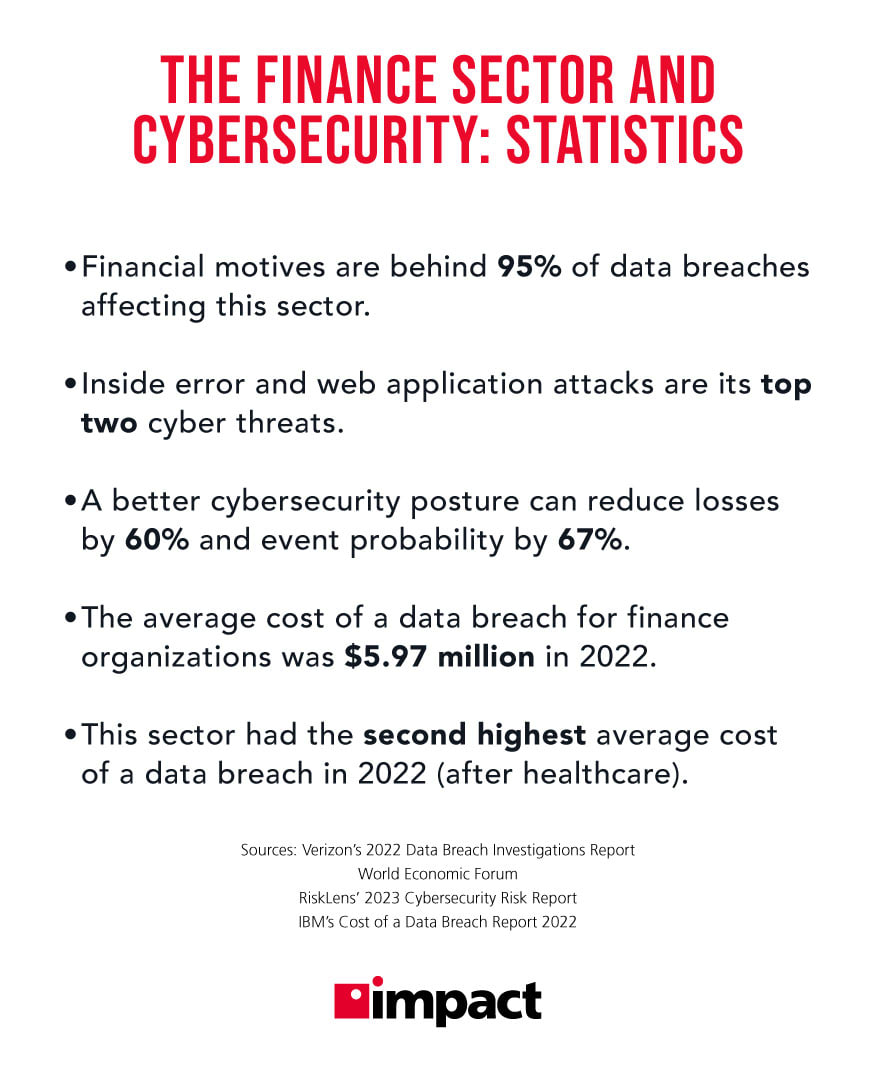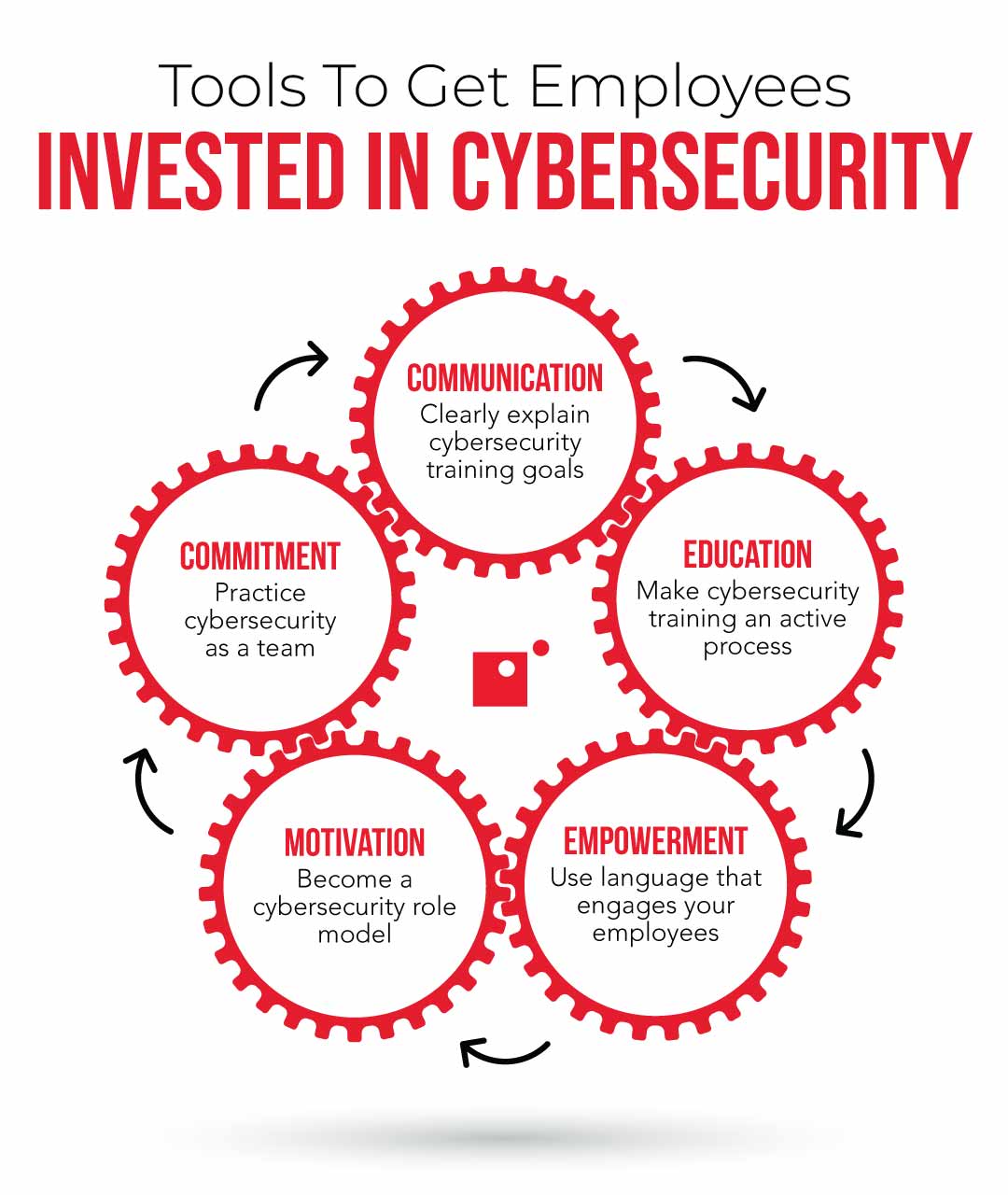A long-term cyberattack managed to successfully take $1.3 million via wire transfers from three private equity firms. The cybercrime gang, named Florentine Banker, used sophisticated social engineering to gather as much information as they could about the company and its employees. This case highlights the need for private equity firms to continue investing in cybersecurity.
Private equity firms are in fact a big target for bad actors due to the amount of personal and financial data they handle. Because of this, it’s critical for firms to improve their cybersecurity culture and technology and grow a culture of security within the organization.
If you’d first like to review the elements of a solid cybersecurity strategy for your business, download Impact’s eBook: What Makes a Good Cybersecurity Defense for a Modern SMB?
Common Cyber Threats Aimed at Private Equity Firms
“The financial sector continues to be victimized by financially motivated organized crime, often via the actions of [phishing], hacking (use of stolen credentials), and malware (ransomware).”
– 2022 Data Breach Investigations Report, Verizon
Here are some of the most common attacks directed at private equity firms and the threats they pose to firms, their portfolio companies, and investors:
Ransomware
Because of the amount of sensitive information being used by equity firms such as bank account numbers, personal addresses, or account information; ransomware is a common form of malware used in the industry. Hackers will steal data and hold it until a cash ransom is paid before releasing it.
Not only will this cost firms a lot of money, but it also affects the trust of their investors and can cause irreparable harm to their reputation.
Financial motives are behind 95% of data breaches affecting the finance sector.
– 2022 Data Breach Investigations Report, Verizon
Spyware is also a big concern in private equity as it secretly records your actions, capturing passwords, login info, financial data, and private market and research data.
Next-gen antivirus and having fully updated software are two ways to protect your organization against malware threats. It is also important to have a backup plan in the event of an attack to re-establish key systems and preserve data.
Phishing
Phishing is a cyberattack in which bad actors use information about a person or organization—which they may gather from sources such as social media—to send them targeted messages. Since the message appears to come from a trusted source, the recipient may be lured into clicking a malicious link or downloading malware-loaded files.
As with many industries, phishing is a major concern in private equity and has resulted in major data breaches, stolen money, and identity theft. The main way that hackers use phishing to attack PE firms is through impersonation emails asking for private data like financial information, personally identifiable information, and more.
Firms can protect themselves against phishing through cybersecurity awareness training that focuses on helping employees spot the signs of a phishing email and by encrypting data and using access management tools to control who has access to sensitive data and accounts.
Stolen Data and Money
The Internet Crime Complain Center reported that more than $4.1 billion was lost in cybercrime attacks in 2020. When hackers know that money is involved, it creates a target, and PE firms are dead in the center. Without proper cybersecurity measures these private equity firms are very vulnerable.
Why It’s Important for Private Equity Firms to Invest in Cybersecurity
Protecting Customer Data
Whether it’s private investor information (financial or personal), confidential research, or transaction information; private equity firms handle a lot of very sensitive data—names, emails, phone numbers, social security numbers, investor information, etc.—that, if stolen, could fetch a large price from hackers selling to a third party or holding the data for a ransom. Not to mention having data stolen can severely impact public image and investor trust as well as the possibility of additional lawsuits.
The global average total cost of a data breach was $4.35 million in 2022, according to the Cost of a Data Breach Report by IBM.
Increased Risk from Portfolio Companies
Smaller portfolio companies can pose a large threat to private equity firms by acting as a doorway for hackers to find entry into a network.
Purchased companies may not have as much cybersecurity infrastructure in place, creating a potential weakness. By investing in their own cybersecurity, private equity firms can mitigate these risks.
Additionally, it’s a good idea for firms to invest in cybersecurity for their portcos, too.
Building a strong security foundation in portfolio companies can provide ROI by curbing value erosion that can occur from penalties (financial and reputational) accrued by data breaches. It also keeps deals from collapsing during due diligence and gives managing firms a better idea of a company’s risk profile to help plan future investments.
PE firms can also be held responsible for any data breaches that occur to their portfolio companies, inviting fines, lawsuits, and regulatory penalties.
Rise in Attack Frequency
“Substantial improvements to security posture and a reduction in the number of records at risk can reduce losses by 60% and event probability by 67%.”
– World Economic Forum
Cyberattacks in many industries have increased since 2020, but especially so in industries like private equity which are responsible for handling more valuable information.
Being under more threat than ever before, firms need to adapt by implementing strong cybersecurity standards and practices into their organizations to stay one step ahead.
How Cybersecurity Helps Protect Private Equity Firms
A cybersecurity strategy for private equity firms involves a lot of different solutions that work together to form a complete protection plan. Here are a few of the things that a cybersecurity team can bring to protect firms.
1. Password Management and Access Controls
Controlling who can access critical information is a major step toward having a strong cybersecurity culture in an organization.
Access management controls assign access to certain data only to those who need it to complete their jobs, limiting the number of people who have access to data reduces the chances of credential misuse internally and better protects those credentials from outside sources.
Additionally, these controls allow leadership to monitor who accesses information, from where they access it, what device they use, and more.
The second part of access control is ensuring you have a password management strategy in place to ensure that passwords and passphrases are strong, consistently updated, and securely stored.
2. Backup and Disaster Recovery
Part of a comprehensive cybersecurity strategy is having a plan in place to recover quickly with backups in place and a set course of action to mitigate costly downtime and get your business back up and running as soon as possible.
3. Next-Gen Antivirus
Old antivirus software simply won’t cut it against the modern threats facing private equity firms anymore and most are no longer being updated by their developers, leaving the same vulnerabilities standing for hackers to figure out and overcome.
Because bad actors are constantly innovating and creating new ways to penetrate your system, firms need next-gen antivirus to elevate protection against viruses and malware. Plus, the latest editions are consistently updated to defend against changing threats.
4. Network Monitoring
Network security monitoring services help firms prevent and quickly react to potential threats to lower the risk of a major breach because of constant vigilance. At Impact, our experts are always monitoring business networks looking for anything out of the ordinary that signals a potential attack.
5. Cybersecurity Awareness Training
The best security strategy against phishing and other social engineering attacks is based on employee training on cybersecurity awareness and best practices.
If your employees do not understand the goals and reasons of having a strong cybersecurity culture, aligning with the protocols will be difficult for them. Cybersecurity education is crucial in order for your staff to learn about its necessity and value.
In Conclusion
Cybersecurity is a must-have for private equity firms who want to secure their data, protect their investors, and avoid fines, reputational hits, and other consequences of a breach. Investing in your security now can pay big dividends in the future and provide a major competitive advantage.
To check whether your financial organization has a strong cybersecurity posture, download the eBook: What Makes a Good Cybersecurity Defense for a Modern SMB?

